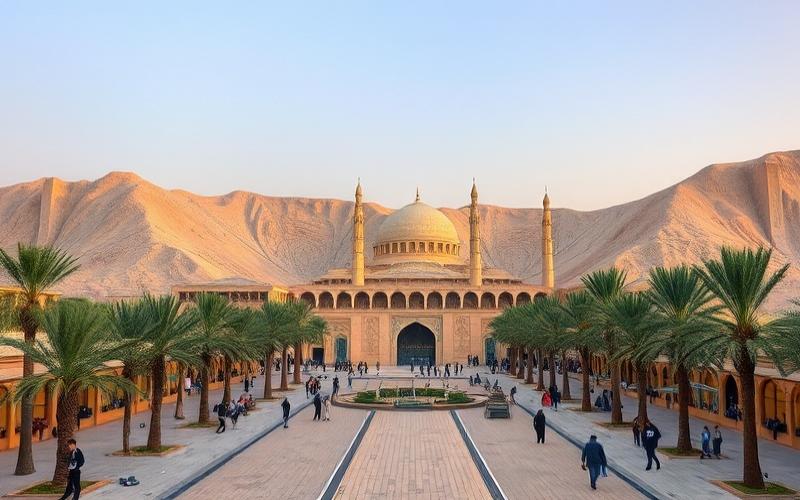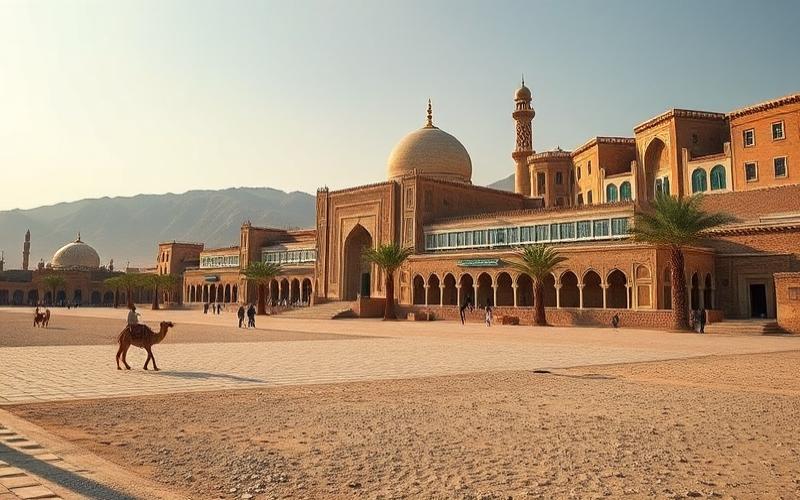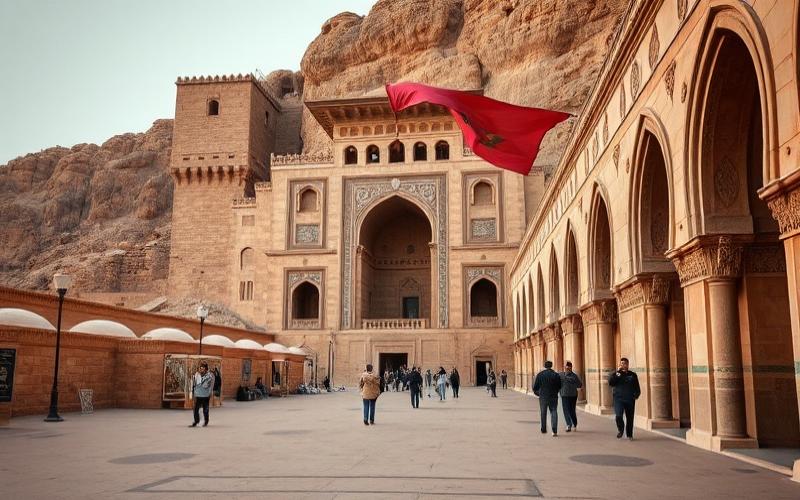
 Published on and written by Cyril Jarnias
Published on and written by Cyril Jarnias
Bahrain’s real estate market offers investors not only excellent opportunities to diversify their portfolio but also significant tax benefits that deserve special attention. In an economic environment that promotes an attractive investment climate, these tax incentives—ranging from no capital gains tax to exemptions from annual property taxes—represent a major advantage for those seeking to maximize their investment returns.
The Bahraini government has established a favorable legal framework that allows investors to benefit from exceptional tax conditions, while promoting growth and stability in the real estate sector.
Exploring Local Taxation in Bahrain
Bahrain stands out for its extremely favorable tax system for real estate investors, both local and foreign.
Absence of Major Taxes:
- No personal income tax: Neither local residents nor foreigners pay tax on their salaries, investment income, capital gains, wealth, inheritance, or gifts.
- No corporate tax for most business sectors, except for the oil and gas sector (taxed at 46%).
- No real estate capital gains tax.
- No property tax or real estate ownership tax for individuals or businesses.
Applicable Taxes:
- VAT: Since 2019, a 10% VAT applies to certain goods and services, but many essential products and some real estate transactions may be exempt or subject to reduced rates.
- Customs duties: Generally at 5%, with exemptions for many raw materials and industrial products.
Exemptions and Benefits for Investors:
- Foreign investors: Access to full ownership in designated areas (Freehold Zones), with no additional tax restrictions compared to nationals.
- Double taxation agreements: Bahrain has signed numerous agreements to avoid double taxation, protecting international investors.
Special Economic Zones and Tax Incentives:
- Free zones and special economic zones: These zones offer benefits such as exemption from customs duties, freedom to repatriate capital, and in some cases, simplified administrative procedures.
- Government incentives: Investment support, administrative assistance, modern infrastructure, and sometimes specific subsidies or aid for strategic projects in real estate or tourism.
Regional Comparison with Other GCC Countries:
| Country | Income Tax | Corporate Tax | VAT | Property Tax | Foreign Property Access |
|---|---|---|---|---|---|
| Bahrain | No | No (except oil) | 10% | No | Yes (designated areas) |
| United Arab Emirates | No | Yes (9% from 2023) | 5% | Variable | Yes (designated areas) |
| Saudi Arabia | No | Yes (20% except oil) | 15% | No | Limited (specific areas) |
| Qatar | No | Yes (10%) | 5% | No | Yes (designated areas) |
| Kuwait | No | Yes (15%) | No | No | Very limited |
| Oman | No | Yes (15%) | 5% | No | Limited |
Recent Legislation or Proposed Bills:
No major real estate tax reforms have been announced for 2025. The tax environment remains stable, with a stated intention to maintain the country’s attractiveness to international investors.
Recent discussions mainly focus on adjusting VAT and improving administrative transparency, with no direct impact on real estate taxation.
Key Takeaways:
Bahrain offers an exceptionally competitive tax framework in the region, with no income tax, no corporate tax (except for the oil sector), and no property or real estate capital gains taxes. Investors thus benefit from an environment conducive to the profitability and security of their real estate investments.
In summary: Bahrain combines the absence of major taxes, tax incentives, and regulatory stability, making it a prime destination for real estate investment in the Gulf.
Good to know:
In Bahrain, real estate investors benefit from an attractive tax environment, as the country imposes neither income tax nor capital gains tax, which is a major advantage compared to several of its GCC neighbors. There are also no property taxes, although the 10% VAT applies to certain transactions. Special economic zones (SEZs) offer additional benefits, such as extended tax exemptions to stimulate foreign investment. More recently, the Bahrain Economic Development Board has introduced new incentives aimed at attracting more real estate investors, including certain stamp duty exemptions. Although tax reforms are regularly discussed to diversify the economy, no significant measures have yet been implemented that could directly affect real estate taxation. Compared to neighboring countries, such as the United Arab Emirates with their recent introduction of corporate tax, Bahrain remains competitive for investors looking to reduce their tax costs.
Understanding International Taxation and Double Taxation Agreements
International taxation aims to coordinate the tax rules of different countries to avoid the same income being taxed multiple times, a phenomenon called double taxation. This challenge particularly concerns investors operating in multiple jurisdictions, as each state may claim the right to tax all or part of the income generated within its territory or by its residents.
Main Challenges for International Investors:
- Double taxation of income (e.g., income tax in two countries)
- Administrative complexity related to managing multiple tax obligations
- Uncertainty regarding the tax treatment of cross-border flows
Mechanisms to Avoid Double Taxation:
- Exclusive allocation of the right to tax to a single state (exemption method)
- Shared taxation with a tax credit granted in the state of residence (credit method)
| Method | Principle |
|---|---|
| Exemption | Only one state taxes the income; sometimes considered for calculating the overall effective rate |
| Credit | Both states tax the income but a tax credit is granted to avoid double burden |
Double Taxation Agreements (DTAs)
Double Taxation Agreements (DTAs) – also called international tax treaties – are signed between two states in order to:
- Clearly allocate taxation rights based on the nature of the income and tax residence
- Establish legal certainty and tax predictability for investors
- Reduce or even completely eliminate double taxation through the mechanisms mentioned above
These agreements play a key role in facilitating cross-border investments by directly reducing the tax cost associated with international operations. They thus promote:
- Free movement of capital
- International attractiveness of the signatory country
- Tax competitiveness compared to its neighbors
Concrete Impact on Decisions and Tax Burdens:
Thanks to DTAs, a real estate investor who receives rental income or realizes a capital gain on real estate in Bahrain while being a tax resident in another partner country benefits either:
- From a total or partial exemption in their country of residence,
- Or from a credit equal to the amount already paid in Bahrain.
Bahraini Specificities:
Bahrain has signed several bilateral agreements explicitly aimed at eliminating double taxation. These agreements notably concern:
- Dividends, interest, and royalties,
- Real estate capital gains,
- Compensation from internationalized work.
Tangible Benefits for Foreign Real Estate Investors Choosing Bahrain as a Destination:
- Protection against any form of double taxation on their rental profits and capital gains.
- Significant reduction in the overall effective rate thanks to the combined effect of low local rates and credits/exemptions obtained via the DTA.
- Increased legal security: contractual stability ensured by these international conventions.
- Administrative simplification: harmonized procedures between Bahrain and its major tax partners.
Summary List of Advantages Offered by These Agreements for Real Estate Investment in Bahrain:
- Immediate or deferred relief of the total tax burden
- Better net profitability after taxes
- Easier access to the Bahraini market without additional risk related to excessive taxation
In summary, thanks to the DTAs concluded by Bahrain with various global economic partners, investing from or to this kingdom often allows for optimizing overall taxation while benefiting from great regulatory security framed internationally.
Good to know:
International taxation represents a major challenge for investors operating in multiple jurisdictions, particularly due to the risk of double taxation, where the same income is taxed in two different countries. Double taxation agreements (DTAs) are designed to address this situation, thereby avoiding excessive tax levies and securing cross-border investment income. Bahrain benefits from several DTAs with key international partners, such as the United Kingdom and France, which strengthens its attractive position for real estate investors. Thanks to these agreements, investors can significantly reduce their tax burdens, thereby improving the profitability of their investments. Choosing Bahrain therefore translates into concrete tax advantages, thanks to these partnerships that support fair and balanced taxation.
Demystifying Property Tax and Occupancy Tax
Differences Between Property Tax and Occupancy Tax
| Criterion | Property Tax | Occupancy Tax |
| Tax Base | Real estate property (land and buildings) | Occupancy of a dwelling (owner or tenant) |
| Liable Party | Owner | Occupant (owner or tenant) |
| Calculation | Cadastral value and local rate | Rental value, local rate, household situation |
| Purpose | Funding local authorities | Funding local services |
- Property tax: annual tax due by the owner, calculated on the value of the real estate property.
- Occupancy tax: tax linked to the occupancy of a dwelling, paid by the occupant as of January 1st, whether owner or tenant.
Specific Application in Bahrain
- Bahrain levies neither property tax nor occupancy tax on property owners or occupants.
- There is no recurring local tax on the ownership or occupancy of a dwelling in Bahrain, unlike France or other European countries.
- Foreign investors can purchase properties in certain designated areas without being subject to these taxes, representing a major advantage for real estate investment.
Influence on Real Estate Investment Decisions
- The absence of property tax and occupancy tax reduces the cost of property ownership in Bahrain, thereby increasing the net return for investors.
- Cash flows related to rental are optimized, as no local levy burdens the income or property value.
- This particularity makes the Bahraini market particularly attractive for international investors seeking advantageous taxation.
Tax Reliefs and Exemptions
- Automatic exemptions: No recurring local taxes on property ownership or occupancy.
- Foreign investors benefit from a total exemption from property tax and occupancy tax in authorized areas.
- Certain other taxes or one-time fees may exist upon purchase (registration fees, transfer duties), but they are generally fixed and non-recurring.
Optimizing Investment Strategies
- Investors can capitalize on the absence of local taxation to:
- Maximize rental profitability.
- Reduce long-term tax risk.
- Plan their investments more serenely without anticipating future increases in local taxes.
- Understanding this tax context allows for adjusting the purchase price, better anticipating cash flows, and offering competitive rents.
International Comparison
| Country | Property Tax | Occupancy Tax | Overall Real Estate Taxation |
| France | Yes | Yes (declining) | Heavy, numerous local taxes |
| United Kingdom | Yes (Council Tax) | Yes | Moderate to high |
| United Arab Emirates | No | No | Very advantageous, close to Bahrain |
| Bahrain | No | No | Almost total absence of local taxation |
Important text:
The absence of property tax and occupancy tax in Bahrain constitutes a major competitive advantage for international real estate investors, allowing for optimized profitability and secure long-term wealth management.
Good to know:
In Bahrain, property tax and occupancy tax differ in important ways and can significantly influence real estate investment strategies. Unlike many other countries, Bahrain does not levy a property tax on ownership, making it an attractive destination for real estate investors. Furthermore, there is no occupancy tax, thereby reducing recurring expenses for owners and occupants. This absence of taxation favors investments, notably allowing for maximized rental yields and simplified financial calculations. In comparison, countries like France impose these taxes, adding an additional layer of costs for owners. Investors in Bahrain must understand this particularity to optimize their strategies, by capitalizing on a tax framework that allows not only for substantial savings but also clearer and more predictable cash flow planning.
Bahrain vs Other Destinations: Where to Invest?
| Destination | Tax Rate on Rental Income | Property Taxes | Specific Tax Incentives | Unique Elements of Tax Regime | Impact on Profitability |
|---|---|---|---|---|---|
| Bahrain | 0 % | 0 % | Income tax exemption, no capital gains tax, unlimited profit repatriation | No corporate tax for individuals, no VAT on residential real estate, total absence of wealth tax | Maximization of net income, no fiscal levy on rents or resale, very attractive environment for the international investor |
| Dubai (UAE) | 0 % (income tax) but 5% VAT on certain goods, municipal fees on rents (~5 %) | No classic property tax, but annual fees (service charge, housing fee) | Income tax exemption, absence of capital gains tax for individuals | Quasi-exempt system, but ancillary fees to consider (municipality, maintenance, etc.) | Rental income lightly taxed, but ancillary charges to anticipate, liquid and regulated market |
| Singapore | Up to 22% for residents, 15-22% non-residents on rental income | Progressive property tax (0-20% of estimated rental income) | Capital gains exemption (except trading activity), some property tax allowances | Progressive tax regime, high taxation for non-residents, numerous regulations for foreigners | Net profitability reduced by taxation, especially for non-residents, stable but highly regulated market |
| London (United Kingdom) | 20% (basic rate), 40% (higher), 45% (additional) on rental income | Council tax and property tax (varies by borough) | Possible allowances (e.g., Wear and Tear Allowance), exemption on principal residence for capital gains under conditions | Complex tax regime, heavy taxation for non-residents, capital gains tax on resale | Net yield often diminished by taxation, necessity to optimize investment structure |
Strengths and Unique Aspects of the Bahraini Tax Regime:
- No taxation on rental income, capital gains, or wealth.
- Total absence of property tax.
- Unrestricted fund repatriation.
- Facilitated property access for foreigners in certain areas.
- Regulatory stability and protection of investor rights.
In Summary:
- Bahrain offers an ultra-competitive tax framework, unique in the region and internationally, allowing for maximized net profitability without recurring or exit tax charges.
- Dubai comes close to this model, but ancillary municipal fees and VAT on certain goods slightly reduce the advantage.
- Singapore and London apply progressive taxations and significant charges, strongly impacting net yield, especially for non-resident investors.
Key takeaway:
Bahrain stands out for a total absence of real estate taxation for private investors, making it one of the most profitable real estate investment destinations in the world.
Good to know:
Bahrain offers a very advantageous tax environment for real estate investors, distinguished by the absence of taxes on rental income and capital gains, which is not the case in Dubai, Singapore, or London. For example, in Dubai, although taxes are relatively low, one must pay annual fees for property management. Singapore imposes a rental income tax rate of up to 22%, while London also applies a capital gains tax of up to 28%. Bahrain, furthermore, levies no property taxes, thus offering a major advantage for profit maximization. Additionally, the country offers significant tax incentives to stimulate investments, making the real estate market particularly attractive compared to these other destinations where tax burdens reduce the return on investment.
Disclaimer: The information provided on this website is for informational purposes only and does not constitute financial, legal, or professional advice. We encourage you to consult qualified experts before making any investment, real estate, or expatriation decisions. Although we strive to maintain up-to-date and accurate information, we do not guarantee the completeness, accuracy, or timeliness of the proposed content. As investment and expatriation involve risks, we disclaim any liability for potential losses or damages arising from the use of this site. Your use of this site confirms your acceptance of these terms and your understanding of the associated risks.
















































